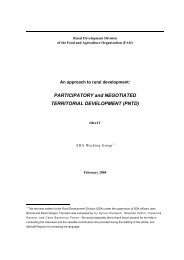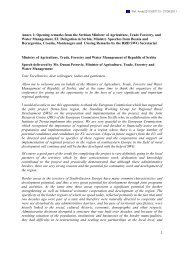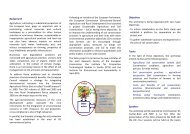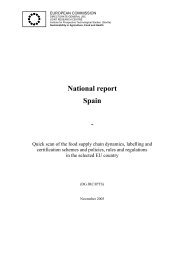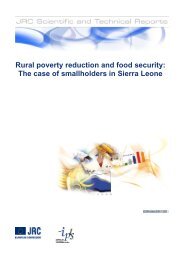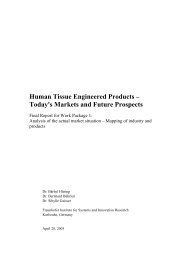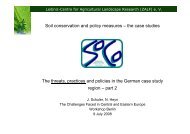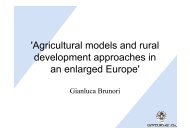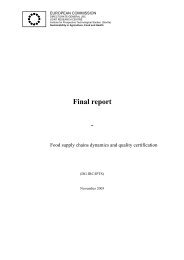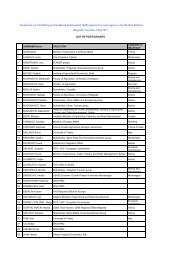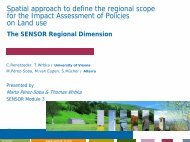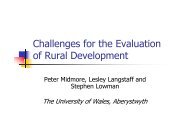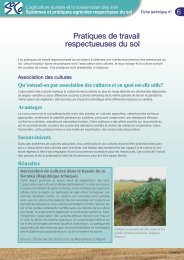SIERRA LEONE maq 4ª.indd - agrilife - Europa
SIERRA LEONE maq 4ª.indd - agrilife - Europa
SIERRA LEONE maq 4ª.indd - agrilife - Europa
Create successful ePaper yourself
Turn your PDF publications into a flip-book with our unique Google optimized e-Paper software.
6.4 Evaluation of the influence of the<br />
support provided<br />
The evaluation of the support received by<br />
smallholders through STABEX-funded measures<br />
(implemented by Action Aid and Welthungerhilfe)<br />
and other aid programmes initiated by the<br />
government (MAFFS Projects and MAFFS<br />
Extension services) and NGO’s in the sample<br />
districts was addressed from a qualitative point of<br />
view. It is important to highlight that all surveyed<br />
smallholders did not take part simultaneously in<br />
all of the above mentioned support programmes.<br />
However, absence of the support from a particular<br />
source is recorded in order to highlight the<br />
relative importance and presence of the different<br />
measures and source of technical assistance<br />
provided to smallholders. One differentiating<br />
factor between the STABEX-funded projects and<br />
the Government based programmes is related to<br />
the participatory approach which prevailed in<br />
the implementation processes of Action Aid and<br />
Welthungerhlife. Besides this particular issue,<br />
the development initiatives concerned were<br />
connected as their general objective is to improve<br />
smallholders’ productivity and food security.<br />
Associated survey results are thus analysed in<br />
this sub-section applying the DAC (Development<br />
Figure 85. OECD-DAC Evaluation criteria and the Logical Framework Approach<br />
Assistance Committee) Criteria used by OECD<br />
for evaluating development assistance (OECD<br />
and Europe Aid, 2010) as a general guideline. A<br />
visual representation of the Logical Framework<br />
Approach for this evaluation process is presented<br />
in Figure 85.<br />
According to the above framework, the<br />
support provided is evaluated following five<br />
criteria: relevance, efficiency, effectiveness,<br />
impact and sustainability. In the current study<br />
the efficiency of the support provided could not<br />
be addressed, since it would require quantitative<br />
analysis of how economic resources/inputs<br />
(funds, expertise, time etc) are converted to<br />
results (i.e. benefits generated per euro of aid<br />
provided) and the survey results, do not contain<br />
quantitative information on the support received<br />
from aid programmes. The qualitative data<br />
available through the survey however does<br />
allow for assessing (relevance, effectiveness,<br />
impact and sustainability of the) aid programmes<br />
to which smallholders had access in terms<br />
of “how different measures are perceived by<br />
smallholders”; and so the analysis must be carried<br />
out taking into account that survey answers are<br />
most likely to be influenced by a (immeasurable)<br />
degree of subjectivity. In the paragraphs below<br />
precise definitions for the criteria set (OECD and<br />
Rural poverty reduction and food security: The case of smallholders in Sierra Leone<br />
135



